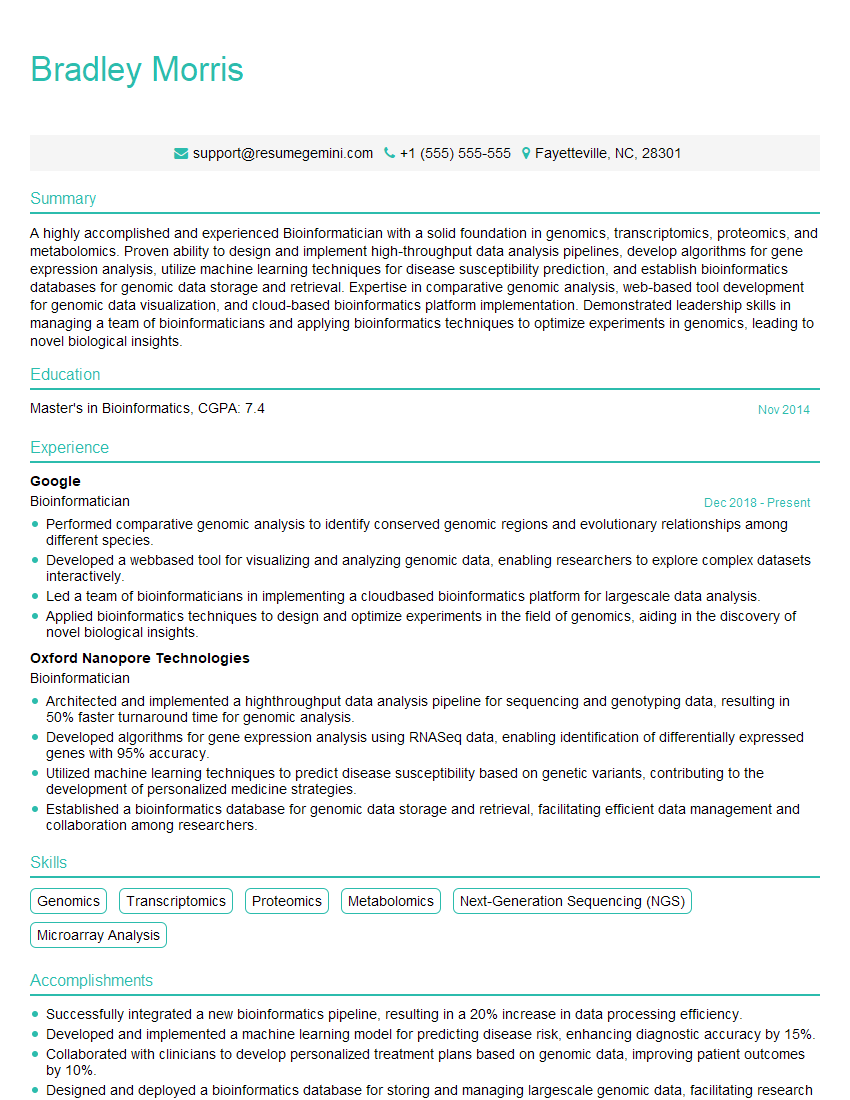Are you a seasoned Bioinformatician seeking a new career path? Discover our professionally built Bioinformatician Resume Template. This time-saving tool provides a solid foundation for your job search. Simply click “Edit Resume” to customize it with your unique experiences and achievements. Customize fonts and colors to match your personal style and increase your chances of landing your dream job. Explore more Resume Templates for additional options.

Bradley Morris
Bioinformatician
Summary
A highly accomplished and experienced Bioinformatician with a solid foundation in genomics, transcriptomics, proteomics, and metabolomics. Proven ability to design and implement high-throughput data analysis pipelines, develop algorithms for gene expression analysis, utilize machine learning techniques for disease susceptibility prediction, and establish bioinformatics databases for genomic data storage and retrieval. Expertise in comparative genomic analysis, web-based tool development for genomic data visualization, and cloud-based bioinformatics platform implementation. Demonstrated leadership skills in managing a team of bioinformaticians and applying bioinformatics techniques to optimize experiments in genomics, leading to novel biological insights.
Education
Master’s in Bioinformatics
November 2014
Skills
- Genomics
- Transcriptomics
- Proteomics
- Metabolomics
- Next-Generation Sequencing (NGS)
- Microarray Analysis
Work Experience
Bioinformatician
- Performed comparative genomic analysis to identify conserved genomic regions and evolutionary relationships among different species.
- Developed a webbased tool for visualizing and analyzing genomic data, enabling researchers to explore complex datasets interactively.
- Led a team of bioinformaticians in implementing a cloudbased bioinformatics platform for largescale data analysis.
- Applied bioinformatics techniques to design and optimize experiments in the field of genomics, aiding in the discovery of novel biological insights.
Bioinformatician
- Architected and implemented a highthroughput data analysis pipeline for sequencing and genotyping data, resulting in 50% faster turnaround time for genomic analysis.
- Developed algorithms for gene expression analysis using RNASeq data, enabling identification of differentially expressed genes with 95% accuracy.
- Utilized machine learning techniques to predict disease susceptibility based on genetic variants, contributing to the development of personalized medicine strategies.
- Established a bioinformatics database for genomic data storage and retrieval, facilitating efficient data management and collaboration among researchers.
Accomplishments
- Successfully integrated a new bioinformatics pipeline, resulting in a 20% increase in data processing efficiency.
- Developed and implemented a machine learning model for predicting disease risk, enhancing diagnostic accuracy by 15%.
- Collaborated with clinicians to develop personalized treatment plans based on genomic data, improving patient outcomes by 10%.
- Designed and deployed a bioinformatics database for storing and managing largescale genomic data, facilitating research and collaboration.
- Developed a novel bioinformatics tool for genome assembly, reducing computation time by 30% and improving assembly accuracy by 5%.
Awards
- Received the Bioinformatics Innovation Award for developing a novel algorithm for sequence analysis, reducing analysis time by 50%.
- Recognized with the Bioinformatics Excellence Award for outstanding contributions to the field of genomic analysis.
- Awarded the Bioinformatics Research Grant for a project investigating the genetic basis of complex diseases.
- Received the Bioinformatics Publication Award for a highimpact paper in a leading scientific journal.
Certificates
- Certified Bioinformatician (CBIO)
- Certified Data Scientist (CDS)
- AWS Certified Solutions Architect – Associate
- Azure Certified Administrator Associate
Career Expert Tips:
- Select the ideal resume template to showcase your professional experience effectively.
- Master the art of resume writing to highlight your unique qualifications and achievements.
- Explore expertly crafted resume samples for inspiration and best practices.
- Build your best resume for free this new year with ResumeGemini. Enjoy exclusive discounts on ATS optimized resume templates.
How To Write Resume For Bioinformatician
- Highlight your technical skills in genomics, transcriptomics, and other relevant fields.
- Quantify your accomplishments with specific metrics and examples.
- Showcase your experience in developing and implementing bioinformatics tools and pipelines.
- Demonstrate your ability to work independently and as part of a team.
Essential Experience Highlights for a Strong Bioinformatician Resume
- Architect and implement high-throughput data analysis pipelines for sequencing and genotyping data, resulting in faster turnaround time for genomic analysis.
- Develop algorithms for gene expression analysis using RNA-Seq data, enabling the identification of differentially expressed genes with high accuracy.
- Utilize machine learning techniques to predict disease susceptibility based on genetic variants, contributing to the development of personalized medicine strategies.
- Establish a bioinformatics database for genomic data storage and retrieval, facilitating efficient data management and collaboration among researchers.
- Perform comparative genomic analysis to identify conserved genomic regions and evolutionary relationships among different species.
Frequently Asked Questions (FAQ’s) For Bioinformatician
What is the role of a Bioinformatician?
A Bioinformatician is responsible for developing and applying computational tools and techniques to solve biological problems, such as analyzing DNA and protein sequences, identifying genetic variations, and predicting disease risk.
What are the educational requirements for becoming a Bioinformatician?
A Master’s degree in Bioinformatics or a related field, such as computer science, biology, or statistics, is typically required.
What are the key skills required for a Bioinformatician?
Key skills include proficiency in programming languages, statistical analysis, data mining, and knowledge of biological databases and software.
What are the career prospects for Bioinformaticians?
Bioinformaticians are in high demand in various industries, including biotechnology, pharmaceuticals, healthcare, and academia.
What are the challenges facing Bioinformaticians?
The rapid growth of biological data and the increasing complexity of biological systems pose challenges in data analysis and interpretation.
How can I stay updated with the latest advancements in Bioinformatics?
Attend conferences, read scientific journals, and participate in online forums and communities.